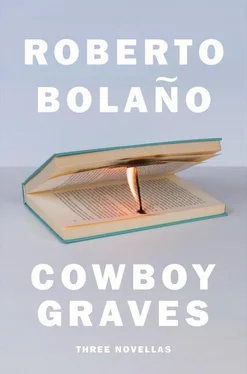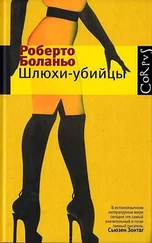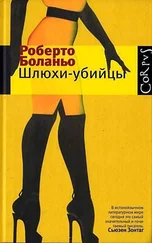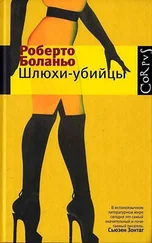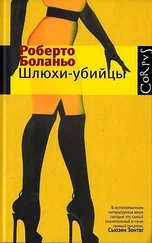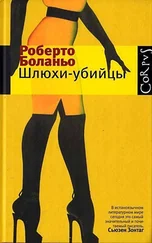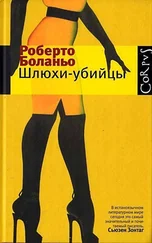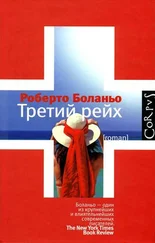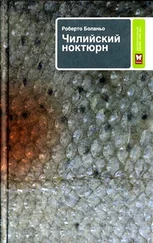Like the queen of the poooor
In jeeeans
long Jesus haaair
kniiife in the pocket
crude flower tattoooo
I was halfway throoough
my miserable liiife
when yooou turned up
flower of the gutter, flower of the diiirt
and I was saaaved.
Like the queen of the poooor.
Nice, I said, looking out the garage door at the passing clouds. It’s not bad, agreed the man, I wrote it three months ago, at La Gorda Martínez’s. After a dreamy silence, he added: where they make a tomato salsa that’s finger-licking good. Then the guitar maker began talking about trips to the Chilean interior as if it were a faraway, exotic country, and about singer-songwriters, pimps, and whores. But I always come back to the shop, he said at last. Before I left, he recited another of his poems for me.
Tempus fugit, darlin’
said the old man to his ladyyy
sittin’ on the edge of the abyss
as the light was fadin’
scraps of memoryyy
come back, come a-flittin’
torn photographs
oh how we wanted
to set life on fire
dressin’ the sky in tatters
Later he walked out to the street with me and showed me the way to a bus stop. We shook hands and I headed off. On a hill I saw two children playing with a metal hoop. I imagined that if I stepped through the hoop, like a trained pig, I would come out in another dimension. That night, I told Mónica everything that had happened to me and I returned the Rilke book. The next day, we went to the movies with my grandmother, who had come to Santiago to see us off and was staying with some relatives until the day of our departure—our first aborted attempt and then also the second (successful) one—though until the plane was in the air I wasn’t convinced we’d be able to leave the country. The rest of my memories are confused. I think I wrote a letter to Mónica (I don’t dare call it a poem) that I later ripped up, then I got my first passport and we went to the movies a few more times.
And here we are back at the airport, and my mother, followed with enormous effort by my sister and me, both of us dragging suitcases that we’re trying to pass off as carry-on luggage, are taken to the Interpol offices. And I remember that everybody was staring at us and that as I became conscious of being watched I was thinking two things: first, that if I’d had my gun (the shotgun that had turned up mysteriously at our house and that I now think belonged to one of my mother’s lovers), I would have shot at the police and then set fire to the airport; second, that they would never let us leave Chile, which meant that my fate was never to see anything or be seen. And then my mother sparred (verbally) with the policemen, and if she was afraid of being arrested, she managed to hide it very skillfully, and she insulted a creditor from the lands that we were leaving behind with the elegance and disdain of someone who practically lived on planes (the phrase jet set had begun to appear frequently in the magazines that she read), hopping from capital to great world capital. And then, assuming the voice of a woman in distress, she asked for a favor, from one Chilean to another. And then she even begged to be allowed to leave, saying that the father of her children was expecting her and he was the kind of man who might commit some foolish act at the slightest provocation. But nothing could be done and that night we weren’t able to get on a plane (there was some claim about an unpaid bill, that was all) and once we’d gotten over the shock we returned to the Vargas sisters’ place with my grandmother (who spent the night there too) and Rebeca Vargas (soothing my frantic mother, what a good friend she was) and one or two other people I can’t remember now. And Mónica was there. She didn’t like goodbyes and she probably had better things to do than go to the airport with some southerners she’d likely never see again, so she made us tell the whole story over, and despite the laughter, that was a sad night. More than sad: black, gloomy, sleepless. And when everyone had gone to bed, I sat out on the balcony in shirtsleeves, freezing to death, with the Parra book unopened in my hands. And when everything seemed most hopeless, my mother had an asthma attack.
He looked like a grub, with his straw hat and a Bali hanging from his lower lip. Every morning, I’d see him sitting on a bench in the Alameda as I went into the Librería de Cristal to browse, and when I raised my head, looking out through the bookstore wall, which really was made of glass, there he was, stock-still, staring into space.
I guess we ended up getting used to each other. I’d show up at eight-thirty in the morning and he’d be there already, sitting on a bench, just smoking and staring into space. I never saw him with a newspaper, a sandwich, a beer. Once, watching him from the French literature shelves, I imagined he must sleep in the Alameda on a bench, or in some doorway on a nearby street, but then I decided that he was too clean to be sleeping on the street and he must have a room in a boardinghouse. He was a creature of habit, like me, I observed. I got up early, ate breakfast with my mother, father, and sister, pretended that I was going to school, and took a bus to the center of the city, where I devoted the first half of the morning to books and walking around and the second half to movies and sex.
I usually bought books at the Librería de Cristal and the Librería el Sótano. If I was short of money, then it was the former, where there was always a bargain table. If I was flush, then it was the latter. If I had no money, I stole indiscriminately from one or the other, slipping a book or two among my textbooks. Either way, a visit to the Librería de Cristal and the Librería el Sótano (across from the Alameda and located in a basement, as the name indicates) was mandatory. Sometimes I arrived before the stores opened and then I would stop at a sandwich cart, buy a ham sandwich and a cup of mango juice, and wait. Sometimes—after my amazing breakfast—I wrote. All of this went on until ten, which was when some of the movie houses had their first show of the day. I preferred European movies, though some inspired mornings I would take my chances on new Mexican cinema.
It was a French movie I saw the most, I think. Two girls live alone in a house in the middle of nowhere. The blonde has split up with her boyfriend and, on top of that (on top of her suffering, I mean), she has personality problems: she thinks she’s in love with her friend. The redhead is younger, more innocent, more irresponsible; in other words, she’s happier (though I was young, innocent, and irresponsible back then and I was convinced that I was deeply unhappy). One day, a fugitive sneaks into the house and takes them captive. The funny thing is that the break-in happens on the very night that the blonde has decided to make love with the redhead and then commit suicide. The fugitive gets in through a window, creeps around the house with a knife in his hand, comes into the redhead’s bedroom, tackles her, ties her up, interrogates her, asks how many other people live in the house. The redhead says it’s just her and the blonde, and he gags her. But the blonde isn’t in her room and the fugitive looks all over the house, getting more and more nervous, until finally he finds her on the basement floor, out cold, evidently having swallowed a whole medicine cabinet full of pills. The fugitive isn’t a killer, or anyway he doesn’t kill women, and he saves the blonde: he makes her throw up, brews her a pot of coffee, etcetera. Then the days go by and the women and the fugitive begin to grow close. The fugitive tells them his story: he’s an ex-con, an ex–bank thief, his wife has left him. The women are cabaret dancers and one afternoon or night (nobody knows exactly what time it is since they’ve been keeping the curtains drawn), they put on a play: the blonde wraps herself in a magnificent bearskin and the redhead pretends to be an animal tamer. At first the bear obeys, but then it rebels and little by little it tears the clothes off the redhead with its claws. At last she falls in defeat, naked, and the bear is on top of her. No, it doesn’t kill her; it makes love to her. And here comes the strangest part: after watching this act, the fugitive falls in love with the blonde, not the redhead; in other words, the bear. The ending is predictable but poetic: one rainy night, after the fugitive kills two ex-comrades, he and the blonde flee to parts unknown and the redhead is left sitting in an armchair, reading, giving them a head start before she calls the police. The book the redhead is reading, I realized the third time I saw the movie, is Camus’s The Fall . I also saw some Mexican movies of more or less the same type: beautiful women who are kidnapped by criminal types; escaped prisoners who snatch rich girls and at the end of a night of passion are riddled with bullets; beautiful maids who start from zero and reach the zenith of wealth and power. Back then almost all movies made in Mexico were erotic thrillers, though there was some erotic horror and erotic comedy too. The horror movies followed the classic line of Mexican horror established in the fifties, as emblematic of my new country’s culture as the muralist painters. Featuring the Saint, the Mad Scientist, the Vampire Cowboy, or the Innocent Girl, they were seasoned with modern nudes (preferably unknown American or European actresses or the occasional Argentine ingenue), explicit sex scenes, and a cruelty bordering on the risible and the unforgivable. Erotic comedy wasn’t my thing.
Читать дальше
